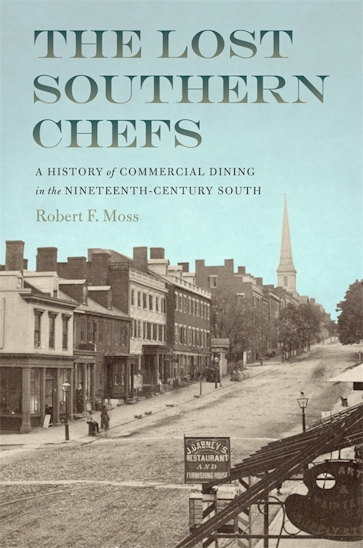The Lost Southern Chefs
A History of Commercial Dining in the Nineteenth-Century South
Title Details
Pages: 304
Illustrations: 39 b&w images
Trim size: 6.000in x 9.000in
Formats
Paperback
Pub Date: 02/15/2022
ISBN: 9-780-8203-6085-0
List Price: $28.95
eBook
Pub Date: 02/15/2022
ISBN: 9-780-8203-6084-3
List Price: $28.95
eBook
Pub Date: 02/15/2022
ISBN: 9-780-8203-6873-3
List Price: $28.95
Related Subjects
COOKING / Regional & Ethnic / American / Southern States
The Lost Southern Chefs
A History of Commercial Dining in the Nineteenth-Century South
Reclaiming and celebrating the diverse voices in our southern food heritage
Skip to
- Description
- Reviews
In recent years, food writers and historians have begun to retell the story of southern food. Heirloom ingredients and traditional recipes have been rediscovered, the foundational role that African Americans played in the evolution of southern cuisine is coming to be recognized, and writers are finally clearing away the cobwebs of romantic myth that have long distorted the picture. The story of southern dining, however, remains incomplete.
The Lost Southern Chefs begins to fill that niche by charting the evolution of commercial dining in the nineteenth-century South. Robert F. Moss punctures long-accepted notions that dining outside the home was universally poor, arguing that what we would today call “fine dining” flourished throughout the region as its towns and cities grew. Moss describes the economic forces and technological advances that revolutionized public dining, reshaped commercial pantries, and gave southerners who loved to eat a wealth of restaurants, hotel dining rooms, oyster houses, confectionery stores, and saloons.
Most important, Moss tells the forgotten stories of the people who drove this culinary revolution. These men and women fully embodied the title “chef,” as they were the chiefs of their kitchens, directing large staffs, staging elaborate events for hundreds of guests, and establishing supply chains for the very best ingredients from across the expanding nation. Many were African Americans or recent immigrants from Europe, and they achieved culinary success despite great barriers and social challenges. These chefs and entrepreneurs became embroiled in the pitched political battles of Reconstruction and Jim Crow, and then their names were all but erased from history.
—Adrian Miller, author of Black Smoke: African Americans and the United States of Barbecue
—David S. Shields, author of Southern Provisions: The Creation and Revival of a Cuisine
—Chandra Jackson, Georgia Library Quarterly



